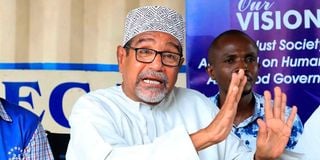Premium
'I don't regret my remarks on Lamu injustices', human rights activist Khelef Khalifa says

Muslims for Human Rights (Muhuri) Chairman Khelef Khalifa during a past press conference in Mombasa.
A veteran human rights defender is in the eye of a storm after making utterances that have been perceived to be incitement against particular communities and religious groups in Lamu County.
Over the weekend, a video clip emerged on social media platforms showing Muslims for Human Rights (Muhuri) Director Khelef Khalifa addressing a gathering in the county.
In his speech, which has since divided opinion mainly across the Coast region, Mr Khalifa touched on sensitive issues such as land ownership, marginalisation on matters of security and development, unfairness in governance and political representation of what he referred to as the ‘indigenous’ people of Lamu.
According to the Muhuri director, communities which relocated into Lamu over the years affected the welfare and development of the indigenous communities.
He further claimed that the inequality has given a leeway for youths to be used in executing terror attacks by the Al-Shabaab militants against non-locals.
When Nation.Africa reached out to him to clarify his remarks which have been criticised by a section of the public, Mr Khalifa insisted that he would not apologise for speaking the truth.
“I don’t regret what I said. If I am given the platform, I will say it again and again until the government hears and addresses it,” he said.
Mr Khalifa claimed that a situation is being witnessed where people from a different region have continued to acquire and have control of land ownership and political governance at the expense of indigenous communities in Lamu.
He complained of a longstanding tension in Lamu that has for years been ignored and could potentially worsen the situation in future.
“The influx of (communities) to Lamu, facilitated by political decisions made during former President Jomo Kenyatta’s administration, should not be misconstrued as a manifestation of free will. Contrary to the popular belief that Kenyans possess the unrestricted right to relocate throughout the republic, this movement reflects a complex interplay of political motivations and socio-economic factors,” said Mr Khalifa.
Concerning marginalisation in development, Mr Khalifa said for the past 10 years, roadblocks and curfews have severely hindered movement and stunted business, critically impacting growth in Lamu County.
In July 2014, the national government banned night travel on the Lamu-Witu-Garsen route following a spate of Al-Shabaab attacks targeting passenger and security vehicles.
Public Service Vehicles (PSVs) were directed to travel only during daytime and in one convoy escorted by armed police. No vehicle is supposed to move along the route past 7pm or before 6am.
The National Cohesion and Integration Commission (NCIC) headquarters told Nation.Africa that the commission had not yet received complaints from anyone about Mr Khalifa’s utterances.
However, the commission added that the matter would be investigated and acted upon as soon as anyone presented a complaint.
Former NCIC Commissioner Morris Dzoro said the contents of the video show that it goes against the spirit for a peaceful and cohesive nation.
While confirming to have seen the video circulating on the various social media platforms, Mr Dzoro asked the NCIC and other arms of government to act by ensuring immediate meetings are held in Lamu to prevent tension among different ethnic communities.
“The video I saw is very destructive on matters of peace and cohesion. It’s dangerous and can land Lamu in a bad state. As an expert on justice, peace and cohesion, I have analysed the video. It incorporates both hate speech and tribal incitement. Immediate action needs to be taken,” said Mr Dzoro.
Lamu County Commissioner Wesley Koech warned against any form of incitement in the region.
Mr Koech said Lamu has recorded great strides on matters of security and development in recent times, a situation he attributes to the improved security and peaceful coexistence among the communities living in the county.
He clarified that despite the improved security along the Lamu-Witu-Garsen route in recent days, the travel arrangements along the route remain the same because the government is still assessing the situation before deciding whether adjustment on the travel arrangements can be done in the near future.
“We need to coexist. Even if differences arise, whether on matters of land, or pressure on inadequate resources like water and pasture, let’s know how to approach them with keenness to avoid plunging this county into darkness. Let’s avoid incitements or taking the law into our own hands. Let’s respect the law of the land,” said Mr Koech.
Khalifa's remarks have divided opinion with some backing him for stating the truth and others castigated him for being reckless in a volatile region.
“Mr Khalifa is right. Injustices have indeed been done to the Lamu people and every time somebody talks, he is branded an inciter. Mr Khalifa has courageously come out to point out matters that many aren’t confident to touch or address. He’s right and I support him,” said Alwy Abdalla, an elder in Lamu Old Town.
The issue has emerged at a time when the Lamu County Assembly is divided along ethnic lines in the approval of a deputy governor to replace the late Raphael Munyua Ndung'u who died on September 6, 2024.
The Members of County Assembly have twice rejected Mr James Gichu who was nominated by Governor Issa Timamy. Voting patterns showed that the MCAs either voted to support or reject the nominee based on tribal lines.
MCAs who were interviewed by Nation.Africa said they were under pressure from their constituents that the seat should be reserved for someone from Lamu’s native communities.





